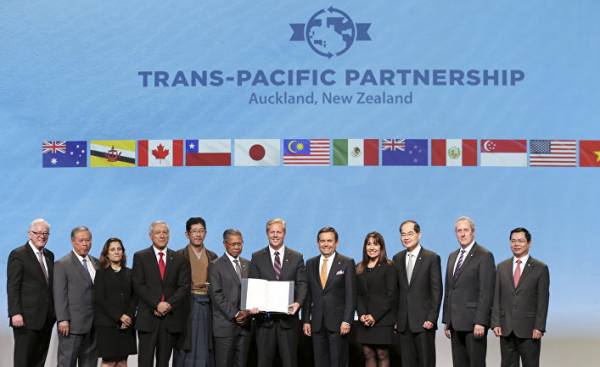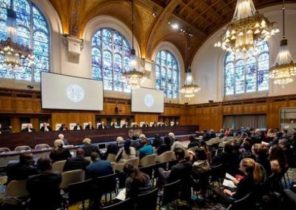
TOKYO — One of the first decisions of Donald trump as President was the rejection of U.S. participation in the TRANS-Pacific partnership (TPP). Many decided then that this is a megaregional trade agreement buried. However, it is possible that this assumption is premature.
The original idea of TTP was to create economic zones operating according to the rules and including 12 countries in the Pacific region — Australia, Brunei, Canada, Chile, Japan, Malaysia, Mexico, New Zealand, Peru, Singapore, USA and Vietnam. The share of these countries together account for about 40% of the world economy. Negotiations on the TPP with great zeal and diligence were five years. For example, in Japan, the group of negotiators led by Akira Amari, who served as Minister of economy and tax policies, day and night, worked on overcoming the opposition of the representatives of various sectors of the Japanese economy (particularly rice producers) and towards the most favorable outcome of the negotiations.
The January decision of trump, taken just before anticipated ratification of the agreement, of course, to the ground shook the entire project. However, many players, who did not want to prevent the collapse of TTP, soon began to discuss the possibility of moving forward without US participation.
In may, Japanese Prime Minister Shinzo Abe announced that, despite the continuing hope for return of America part of the TPP, Japan is ready to assume a leadership role in the process of working on this agreement. Soon after, Japan and New Zealand has announced that it will attempt in November to negotiate with the other parties to the TPP on further joint steps. If they succeed in this endeavor, then the parties to the TPP will benefit tremendously, and the US will find that we have missed a huge chance.
In the world there are two different ways to enhance freedom of trade. The first approach is a global model, embodied in the world trade organization. The main advantage of this approach is scale. Because of this, the vast majority of world economy is interconnected, with most countries in the world follow common rules and are subject to the dispute resolution mechanism that ensures compliance with these rules.
However, the scale is both the main weakness of the WTO as extremely difficult to reach agreement between so many countries about common rules. In addition, the negotiation process in the WTO is often very painful and long, even longer than it took to reach agreement on TPP. This is the main reason why the negotiations in the WTO stalled during the Doha round, which began in 2001 and not completed any agreements.
The second method is the extension of free trade — bilateral agreements, which address the problem of scale. When the negotiations involved only two or three countries, to lead them becomes much easier, they often require less time. For example, Japan and the European Union recently with the new force took over achieving a bilateral trade agreement, negotiations on which began in 2009. The final looms, despite continuing disagreements on a small number of key issues.
However, this approach has a negative side. And it’s not just that benefit from it receive only two countries; the transaction favorable to the parties to a bilateral agreement, can be very disadvantageous to countries that do not participate in it. In the case of the agreement between Japan and the EU, this country may well be the US, because American companies compete in Japan with the European businesses in many sectors.
TTP, which was attended by 12 countries (now they became 11), is somewhere in the middle between these two approaches. It is a way to take the best of the two, described above, of the worlds. TTP megaregional approach brings more economic benefits than bilateral agreements, because it stimulates an increase in trade and investment flows (for example, by harmonizing regulations and standards) on the larger plot of the global economy. However, unlike the WTO, this area is not so large and covers not so different countries that reach agreement has become incredibly difficult.
Megaregional approach has another advantage inherent in the WTO: participation of a larger number of countries allows us to weaken the dictatorship of one major country, thereby limiting its chances to force negotiating partners to an unbalanced agreement. By the way, that is why trump, with his penchant for “the art to make deals” and promise of trade policy on the principle of “America first”, most likely, and rejected TTP. He believes that bilateral agreements, the US political and economic hegemony, a more powerful negotiating position.
But trump does not understand that a small country really feel intimidated US at the negotiating table can get up and leave. But more importantly, despite the possibility of using US its weight in bilateral negotiations for more favorable terms, these benefits don’t necessarily outweigh the benefits of more large-scale agreements.
This is, without a doubt, the case with the agreement on the TPP, which contains a few items that were extremely beneficial for the American economy. In particular, this agreement opened the American businesses access to markets that have long had for him for the most part closed. In addition, the provisions regarding intellectual property rights, accounting and the settlement of disputes, were so favorable wall street and American lawyers that they were criticized for unfairness in relation to other countries. However, all this was agreed because it was expected that over time, China will be forced to adopt the standards.
In this sense, as I said Jagdish Bhagwati of Columbia University, “the TTP was kind of like permission to play at the Golf club, provided that on weekends, the club members will go to a certain Church”. The parties to the agreement have signed it for the sake of Golf, that is for the sake of expanding trade and investment flows. However, they are unable to evade the obligation to make regulations favorable to the United States, hoping that this Liturgy will allow us to curb China.
The role of the US in this scenario is unique because they had a strong national interest in Golf, and in the Church. Now they will not get neither one nor the other. And when a new TPP without the United States, will begin to flourish, American business will regret that tramp was deprived of his traditional tea.







